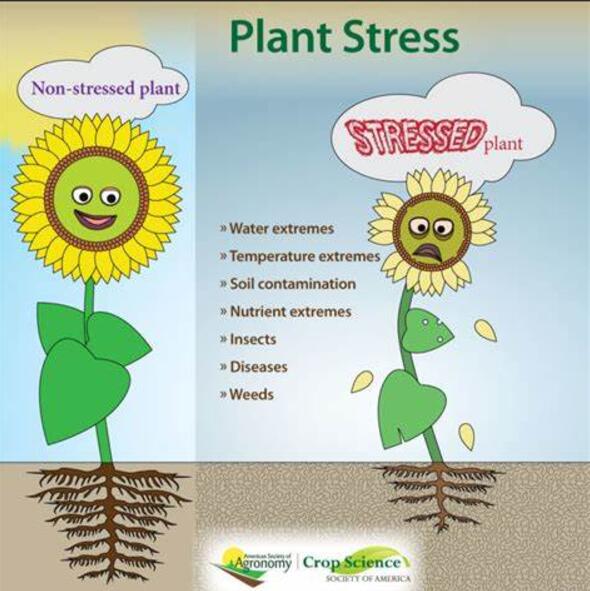Endophytic fungi as regulators of phytohormones production: Cytomolecular effects on plant growth, stress protection and importance in sustainable agriculture
IF 6.8
Q1 PLANT SCIENCES
引用次数: 0
Abstract
Plants adjust their physiology, biology and phenotype to survive in various environmental situations and organize their responses to unfavorable conditions. Phenotypic and physiologic flexibility of various plant species may be mediated by numerous microorganisms, including endophytic fungi. These beneficial fungi are capable of increasing plant growth via either enhancing plant immunity to biotic and abiotic environmental stimuli, or by producing growth-stimulating factors such as phytohormones. Phytohormones have vital roles in plant resistance mechanisms and can be considered as growth regulators via their prominent effect on plant metabolism. Exogenous use of various hormones can increase plant growth factors and decrease harmful effects of environmental stresses. Recent investigations revealed that phytohormones production or regulation by beneficial fungi could be critical metabolic engineering targets for activating plant resistance to environmental stimuli. Signaling pathways involved in phytohormones biosynthesis and mechanisms related to this process have been identified using numerous biochemical and molecular approaches. This review is focused on production and regulation of some phytohormones by endophytic fungi and current knowledge on the vital role of these small biological molecules in increasing immunity responses in plants exposed to environmental cues. Therefore, the present review can be useful for plant pathologists, physiologists and environmental microbiologists for designing novel and effective strategies to develop broad-spectrum microbial inoculants supporting plant growth and organic crop production under unfavorable conditions. Focus on exploring cytomolecular and biochemical mechanisms involved in the effect of fungi and other beneficial microbes on producing or regulating phytohormone levels in plant tissues seems to be interesting subjects for future research.
内生真菌作为植物激素产生的调节因子:细胞分子对植物生长的影响、胁迫保护及其在可持续农业中的重要性
植物通过调整生理、生物学和表型来适应各种环境,并组织对不利条件的反应。各种植物的表型和生理灵活性可能由许多微生物介导,包括内生真菌。这些有益真菌能够通过增强植物对生物和非生物环境刺激的免疫力,或通过产生植物激素等生长刺激因子来促进植物生长。植物激素在植物抗性机制中起着至关重要的作用,通过对植物代谢的显著作用可以被认为是生长调节剂。外源使用各种激素可以增加植物生长因子,减少环境胁迫的有害影响。最近的研究表明,植物激素的产生或有益真菌的调节可能是激活植物对环境刺激的抗性的关键代谢工程靶点。参与植物激素生物合成的信号通路和与此过程相关的机制已经通过许多生物化学和分子方法确定。本文综述了内生真菌对一些植物激素的产生和调控,以及这些小生物分子在增加植物暴露于环境线索的免疫反应中所起的重要作用。因此,本文综述可以为植物病理学家、生理学家和环境微生物学家设计新的、有效的策略来开发支持植物生长和有机作物生产的广谱微生物接种剂提供参考。重点探索真菌和其他有益微生物对植物组织中植物激素产生或调节作用的细胞分子和生化机制似乎是未来研究的有趣课题。
本文章由计算机程序翻译,如有差异,请以英文原文为准。
求助全文
约1分钟内获得全文
求助全文
来源期刊

Plant Stress
PLANT SCIENCES-
CiteScore
5.20
自引率
8.00%
发文量
76
审稿时长
63 days
期刊介绍:
The journal Plant Stress deals with plant (or other photoautotrophs, such as algae, cyanobacteria and lichens) responses to abiotic and biotic stress factors that can result in limited growth and productivity. Such responses can be analyzed and described at a physiological, biochemical and molecular level. Experimental approaches/technologies aiming to improve growth and productivity with a potential for downstream validation under stress conditions will also be considered. Both fundamental and applied research manuscripts are welcome, provided that clear mechanistic hypotheses are made and descriptive approaches are avoided. In addition, high-quality review articles will also be considered, provided they follow a critical approach and stimulate thought for future research avenues.
Plant Stress welcomes high-quality manuscripts related (but not limited) to interactions between plants and:
Lack of water (drought) and excess (flooding),
Salinity stress,
Elevated temperature and/or low temperature (chilling and freezing),
Hypoxia and/or anoxia,
Mineral nutrient excess and/or deficiency,
Heavy metals and/or metalloids,
Plant priming (chemical, biological, physiological, nanomaterial, biostimulant) approaches for improved stress protection,
Viral, phytoplasma, bacterial and fungal plant-pathogen interactions.
The journal welcomes basic and applied research articles, as well as review articles and short communications. All submitted manuscripts will be subject to a thorough peer-reviewing process.
 求助内容:
求助内容: 应助结果提醒方式:
应助结果提醒方式:


